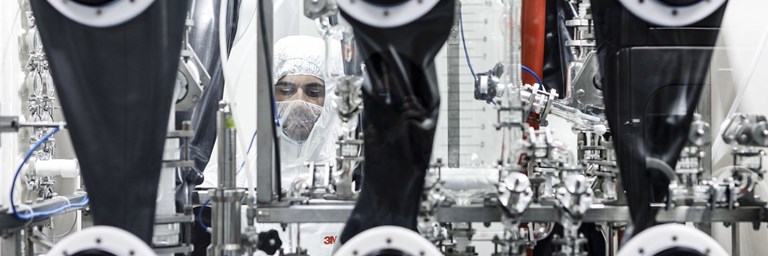“CRDMO” the new business model for future of the (Bio)Pharma Industry

Today CDMOs face excellent growth opportunities in a pharmaceutical market environment where using outsourcing services is becoming the new norm. Indeed, the outlook for outsourcing is brighter than ever as ever more pharmaceutical and biotechnology firms continue to rely more heavily on external service providers for research, development and manufacturing of their own R&D pipeline and products portfolio.
According to an analysis conducted by Grand View Research, the current outsourced market is estimated to be about $90 billion and is projected to grow at a healthy CAGR of about 7% to approximately$117.3 billion by 2023 and to represent about 30% of the overall manufacturing requirements.[1] The Big Pharma downsizing and the continued rise of small- and -medium virtual biotech firms in the pharmaceutical market are contributing to the increase in the outsourcing trend, widening the lane for growth in the CDMO space.
NEW OPPORTUNITIES IN THE CDMO MARKET
In order to satisfy the growing demand for outsourced Drug Substances & Drug Products manufacturing services, CDMOs have been continuing to heavily invest capital in expanding capacity to support growth, especially in areas of the market where there are capacity bottlenecks. CDMOs looking to enhance their growth generally have two strategic options: they can either integrate vertically by offering new services for existing Dosage Forms (DFs) or Active Pharmaceutical Ingredients (APIs) production or integrate horizontally by offering existing services for new dosage forms.
This is beginning to change however, as more mergers and acquisitions (M&A) take place across the CDMO sector, with significant consolidation expected in the next few years. This is in line with the preferences of many pharmaceutical companies; more and more customers are choosing to outsource to one full-service CDMO rather than several niche providers, as this simplifies the supply chain and can reduce time to market.
Although the choice of M&A is strongly linked to the financial means of the CDMO, in which the funds required will often exceed the equity capital that a CDMO has at its disposal, the M&A strategy results be the most win-win option. A M&A allows a CDMO to expand relatively quickly as production facilities, know-how, human capital and organisational structures are already in place at the target. Building these capabilities organically can be a major challenge. Furthermore, an acquisition can add new technologies to the CDMO’s portfolio and give it access to new customer groups, opening opportunities for cross-selling. Another aspect that is playing an ever more important role in the consolidate of the CDMO M&A strategy capitalizes is on the fact that big pharma continues to divest manufacturing assets in an effort to reduce their manufacturing footprint. Pharma asset divestments are seen as an attractive acquisition opportunity by many CDMOs, as ex-pharma manufacturing facilities are generally high quality with a well-experienced workforce.
The CDMO sector agrees that the current pharmaceutical outsourcing market trend is creating opportunities for business growth. There is some concern, however, that growing market consolidation is a major risk for many CDMOs. Smaller CDMOs in particular might be unable to compete on costs, technology or service range with the growing number of large CDMOs that consistently expand their services and technological capabilities by acquiring other market participants. They also face the threat of being unable to compete for skilled employees. Qualified scientists and experienced project managers are in high demand for companies throughout the sector, and CDMOs thus not only have to compete for talent with their immediate competitors but also with large, global pharmaceutical companies.
Pharmaceutical companies are increasingly outsourcing low volume formulations, such as niche and orphan drugs, which involve high risks and low revenues. The current high level of fragmentation of the market implies that some CDMOs have to rely on only one or more customers for a large part of their revenues.
This dependence is dangerous and creates a lot of negotiating power for the customer to exercise downward pressure on prices.
C”R”DMO: CONNECTING R&D AND MANUFACTURING
Reliance on contract service providers is increasing in the pharmaceutical industry as drug makers seek to increase efficiency and productivity and gain access to advanced technologies and expertise that are not practical to develop internally. Outsourcing is occurring across all phases Company profile customer’s publication of development from discovery through final-product manufacturing. Although demand for API development and manufacturing services is currently much greater than that for discovery, final-product formulation and production support, pharmaceutical companies are seeking more strategic partnerships with service providers that offer a broad portfolio of innovative and specialized capabilities.
The CDMO industry is currently a very fragmented space. Going forward, the success tomorrow’s pharmaceutical industry will be that of consolidating and combining a CRO + CDMO business model targeted to creating a new global market standard based on the concept “CRDMO”. The “R” of CRDMO brings the dimension of research in-house as the key metric to ensure a successful connection between R&D and Manufacturing, with the aim of becoming “one-stop shops” capable of supporting outsourcing projects across the whole drug development lifecycle, from discovery up to commercialization.
“Building end-to-end capabilities and offering integrated solutions in the small molecule space is our vision. Clients and the market want a one-stop shop and a partner who can take care of the entire project. At Angelini we are investing in the API / HPAPI space integrating new R&D and kilo- and pilot-scale capacity to broad our custom services portfolio. The investments on-going represent a milestone in Angelini’s long-term strategic plan to expand its market presence and customers/partners network.” said Giovanni De Filippo, Fine Chemicals Sales & BD Head (Angelini Pharma SpA | Fine Chemicals Business Unit).
